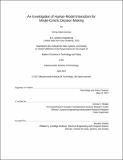| dc.contributor.advisor | Donna H. Rhodes. | en_US |
| dc.contributor.author | German, Erling Shane | en_US |
| dc.contributor.other | Technology and Policy Program. | en_US |
| dc.date.accessioned | 2017-09-15T14:20:16Z | |
| dc.date.available | 2017-09-15T14:20:16Z | |
| dc.date.copyright | 2017 | en_US |
| dc.date.issued | 2017 | en_US |
| dc.identifier.uri | http://hdl.handle.net/1721.1/111228 | |
| dc.description | Thesis: S.M. in Technology and Policy, Massachusetts Institute of Technology, School of Engineering, Institute for Data, Systems, and Society, Technology and Policy Program, 2017. | en_US |
| dc.description | This electronic version was submitted by the student author. The certified thesis is available in the Institute Archives and Special Collections. | en_US |
| dc.description | Cataloged from student-submitted PDF version of thesis. | en_US |
| dc.description | Includes bibliographical references (pages 101-107). | en_US |
| dc.description.abstract | This thesis presents an investigation of human-model interaction in relation to model-centric decision-making. Models are abstractions, or simplifications, of reality that humans use to augment their ability to make sense of the world, anticipate future outcomes, and make decisions. This thesis focuses on models that aid decision-making in the design and operation of technological systems. Model-centric engineering is transforming traditional engineering towards a paradigm of comprehensive, integrated model use throughout the lifecycle of complex systems. This model-centric shift aims to increase the efficiency and efficacy of system decision-making. Without appropriately considering and designing for the human element, however, model-centric engineering will fail to achieve its desired results. Enabling effective human-model interaction, therefore, is crucial for realizing the value that models and model-centric engineering practice can provide. Advances in model technology and computational resources have been steadily made, however, the many facets of the human-model interaction experience remain relatively unexplored. Through empirical and qualitative methods, this thesis presents an exploration of human-model interaction in an effort to identify decision-making challenges, and appropriate mitigations, for individuals in model-centric environments. Learning from existing literature and past situations with similar considerations is a useful place to start in investigating the human aspects. Two analogy case studies reveal relevant individual and organizational challenges that may affect human-model interaction and decision-making within model-centric environments. An expert interview-based study yields empirical insight from thirty experts into sociotechnical factors that influence the trust and use of models by various types of actors within the model-centric decision-making process. Additionally, as automation, autonomy, and artificial intelligence (AI) will likely play key roles in successful model-centric engineering, relevant literature-based considerations are presented for how the capabilities of AI and autonomy may relate to a model-centric context. This cumulative research is ultimately distilled into twenty-nine descriptive and prescriptive heuristics for enabling effective human-model interaction and model-centric decision-making. These heuristics emerged from the voice of the experts interviewed, as well as from case studies and literature analyzed. Policy considerations based on this investigation are discussed, along with a suggested strategy of planned adaption for model-centric policymaking. Overall, this research aims to generate grounded theory to motivate and guide future research and development for enabling effective human-model interaction and model-centric decision-making. | en_US |
| dc.description.statementofresponsibility | by Erling Shane German. | en_US |
| dc.format.extent | 132 pages | en_US |
| dc.language.iso | eng | en_US |
| dc.publisher | Massachusetts Institute of Technology | en_US |
| dc.rights | MIT theses are protected by copyright. They may be viewed, downloaded, or printed from this source but further reproduction or distribution in any format is prohibited without written permission. | en_US |
| dc.rights.uri | http://dspace.mit.edu/handle/1721.1/7582 | en_US |
| dc.subject | Institute for Data, Systems, and Society. | en_US |
| dc.subject | Engineering Systems Division. | en_US |
| dc.subject | Technology and Policy Program. | en_US |
| dc.title | An investigation of human-model interaction for model-centric decision-making | en_US |
| dc.type | Thesis | en_US |
| dc.description.degree | S.M. in Technology and Policy | en_US |
| dc.contributor.department | Massachusetts Institute of Technology. Engineering Systems Division | |
| dc.contributor.department | Massachusetts Institute of Technology. Institute for Data, Systems, and Society | |
| dc.contributor.department | Technology and Policy Program | |
| dc.identifier.oclc | 1003283987 | en_US |
